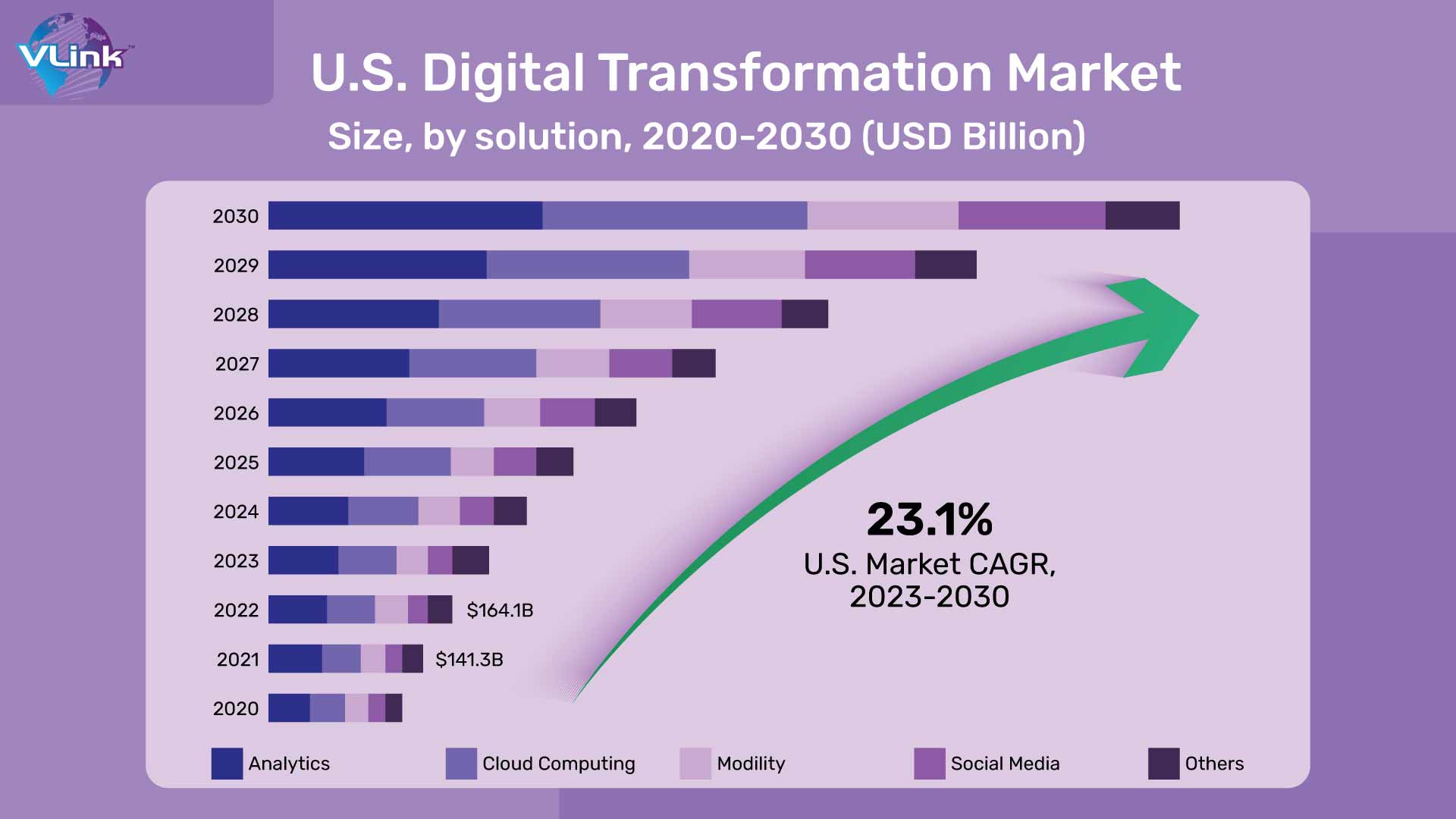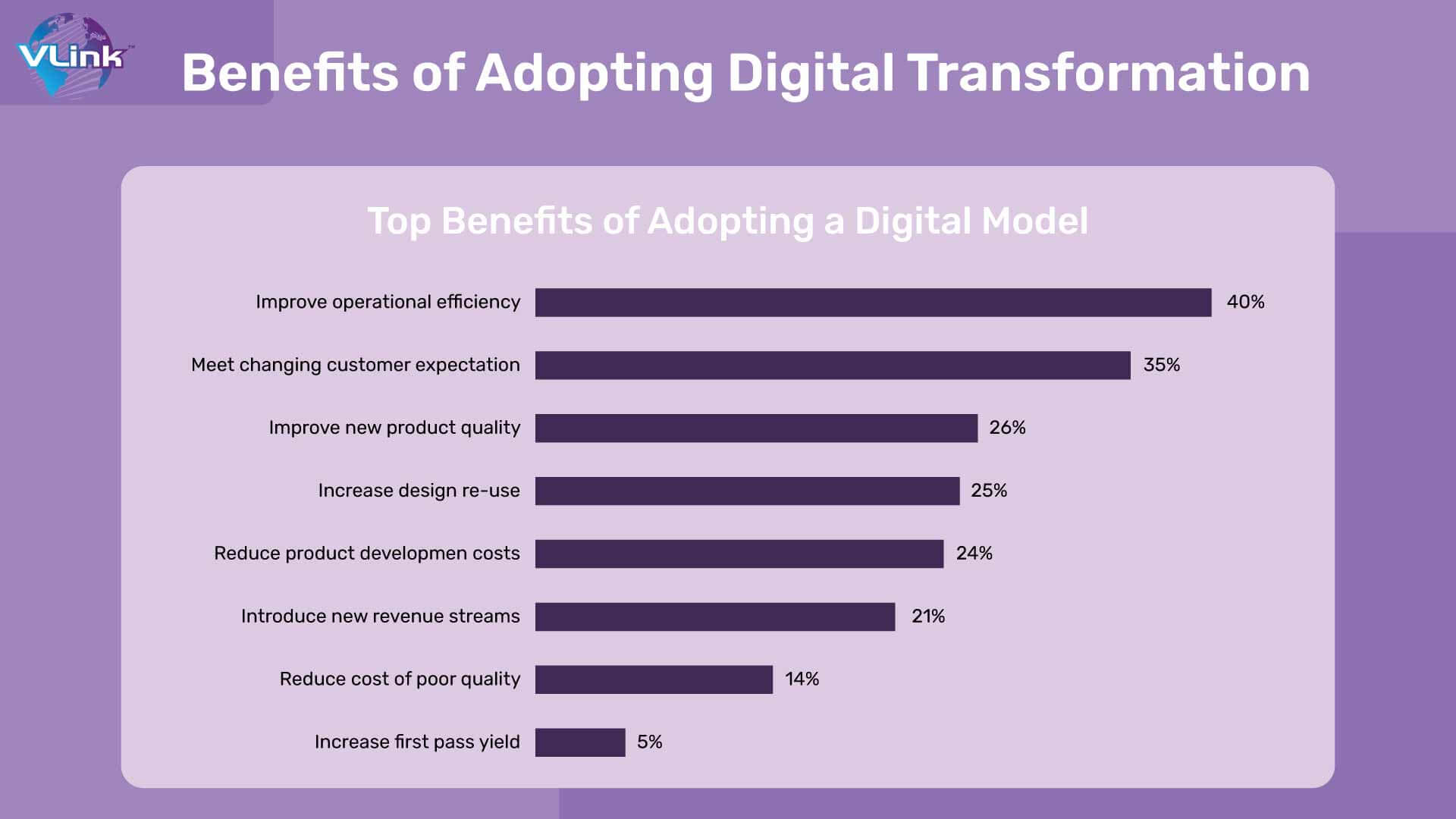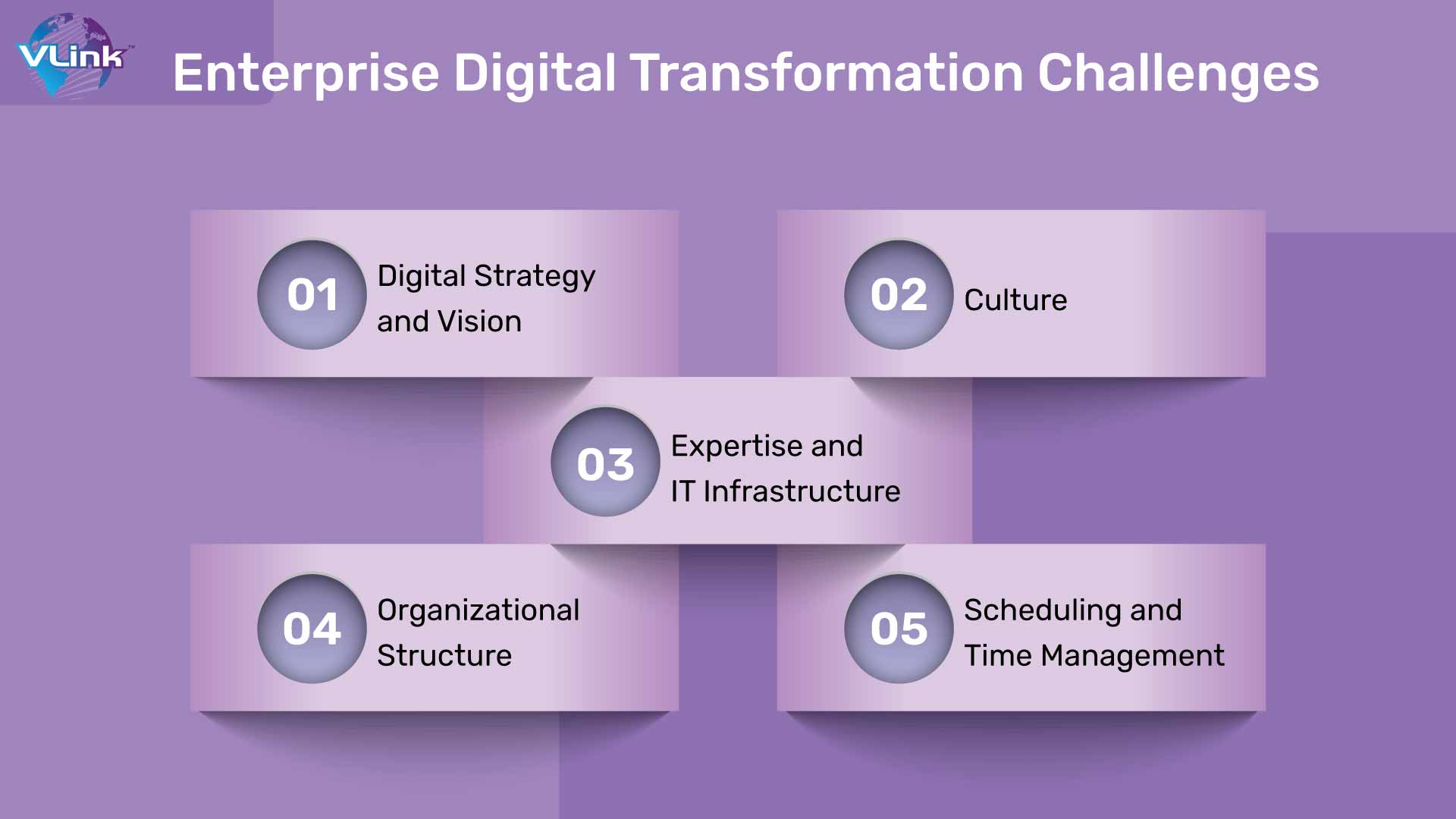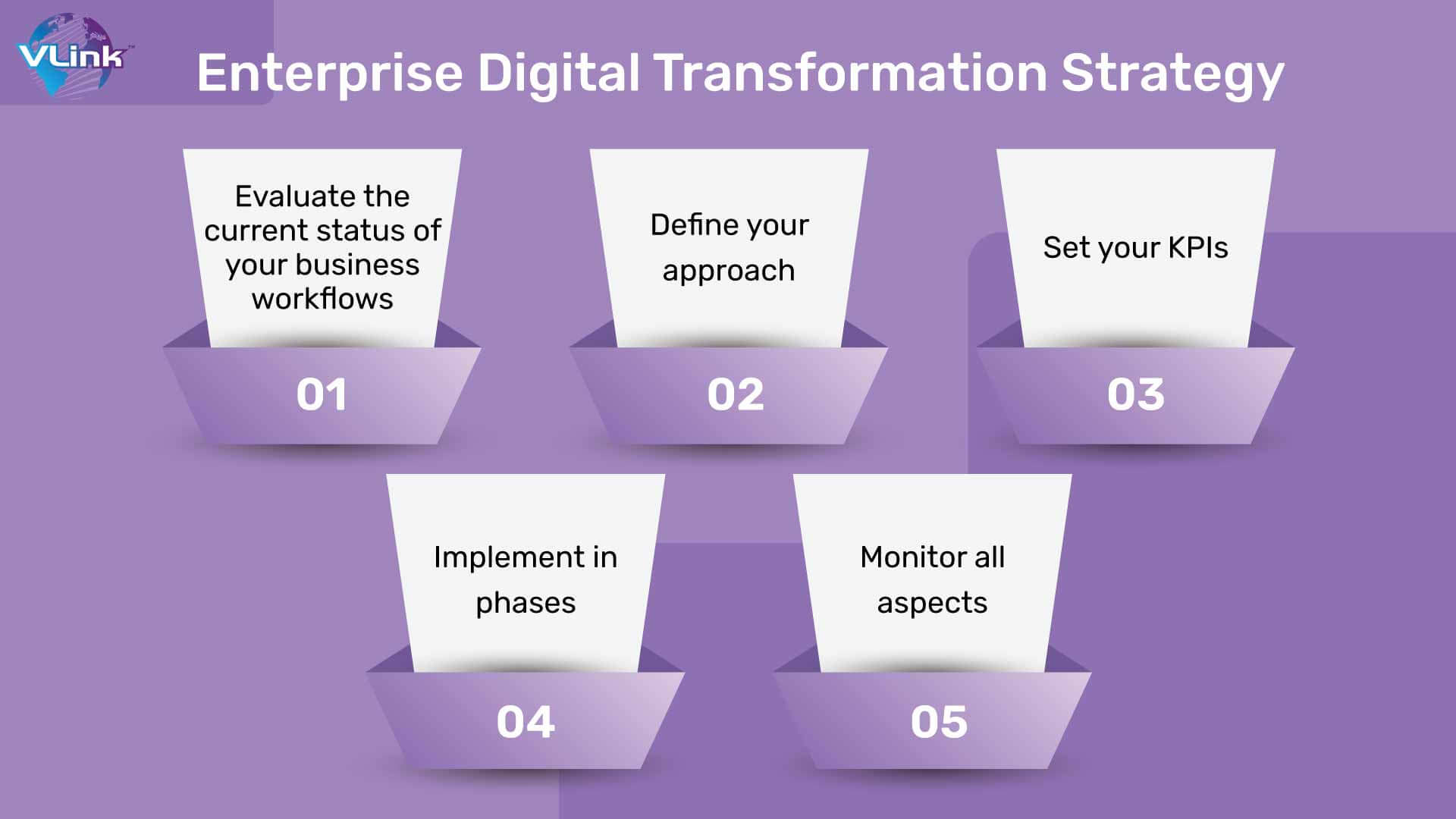In today’s competitive world, businesses must proactively adopt top-tier strategies and fully leverage digital technology to stay ahead. For this, enterprise digital transformation is an excellent investment. Digital transformation consulting assists companies in achieving agile, connected, and customer-centric results through the strategic utilization of digital technology.
Undoubtedly, digital transformation is one of the most crucial concepts in today’s online business. According to Statista, worldwide digital transformation spending is predicted to reach $3.4 trillion by 2026. Its US market sizes are shown in below figure:

If you plan to implement digital transformation into your business with enterprise software development, you are at the right place!
This blog will discuss the definitive guide to enterprise digital transformation, benefits, key features and practices.
Let’s first start with its brief introduction!
What is Enterprise Digital Transformation?
Enterprise digital transformation refers to using digital technologies, strategies, and tools to fundamentally change and improve various aspects of an organization's operations, business models, methods, and customer experiences.
Enterprise digital transformation aims to leverage technology to drive innovation, enhance efficiency, increase agility, and create new value propositions for internal stakeholders and customers.
Key elements of enterprise digital transformation
- Technology Adoption
- Process Optimization
- Data Utilization
- Customer Experience Enhancement
- Innovation and New Business Models
- Cultural and Organizational Shift
- Change Management
- Risk Management and Security
- Collaboration and Connectivity
- Agility and Scalability
Why is Digital Transformation Popular?
Only 8% of global companies achieve their targeted business outcomes from their investments in digital technology.
In a digital-centric world, digital transformation is essential for any business to grow and stay competitive. It enables enterprises to adapt to a rapidly shifting market and continuously improve their operations.
Here are some facts about digital transformation:
- According to Markets and Markets, the digital transformation market size will grow at a CAGR rate of 19.1% from 2021 to 2026.
- Digitalized companies are projected to contribute over half the GDP by 2023, accounting for $53.3 trillion.
- 91% of businesses are engaged in some form of digital initiative, and 87% of experienced business leaders say digital transformation is a priority.
- Companies have spent $58.3 bn on AI in 2021, which will rise to $309.6 bn by 2026.
Benefits of Enterprise Digital Transformation

Digital transformation streamlines processes, automates tasks, and eliminates manual and redundant activities. It increases operational efficiency, reduces errors, and faster response times.
Companies that implemented digital transformation observed improved efficiency and profitability. According to the SAP Center’s reports:
- 80% of enterprises that have digitalized reporting increased profits
- 85% say they have enhanced their market share
- On average, leaders expect 23% higher revenue growth over their competitors
Digital tools enable businesses to better understand customers' needs, preferences, and behaviors. It allows for personalized experiences, targeted marketing, and improved customer service, ultimately enhancing customer satisfaction and loyalty.
Automation of routine tasks allows employees to focus on higher-value work that requires creativity, problem-solving, and critical thinking. It can lead to greater job satisfaction and professional development.
Improving customer relationships with your product and services will boost your business's revenue. So, adopting digital transformation is an excellent idea for enterprises.
Organizations that successfully undergo digital transformation gain a competitive edge in their industry. They can adapt quickly to market changes, meet customer demands faster, and outpace traditional competitors.
Challenges Businesses Face with Enterprise Digital Transformation

Digital Strategy and Vision
No doubt, interactions & communication meet competitive demands when delivering software packages to clients. Many enterprises adopt new technologies to match customers’ expectations.
In addition, you can implement digital transformation into your company’s assets and skills to increase sales. On top of that, you might use the KPIs (Key Performance Indicators) to understand your organization’s improvement area.
Culture
Another challenge businesses face when implementing digital transformation is societal issues. Enterprise digital transition requires process and organization modifications.
Therefore, creating a workforce management strategy for a business’s digital revolution approach is essential. Ensure your employees know about the enterprise’s digitization objectives, process, and time.
Expertise and IT Infrastructure
There often needs to be more skilled professionals who can lead and execute digital transformation initiatives, such as data scientists, AI specialists, cybersecurity experts, and software developers.
Integrating new technology into an enterprise's digital transformation strategy can also be challenging.
Organizational Structure
Many companies have established procedures for increasing corporate and departmental goals. Lack of data visibility among employees could lead to a restricted workflow. As a business owner, you must develop essential strategies to identify issues with enterprise digital transitions and enhance your company’s profitability.
Scheduling and Time Management
Another critical challenge of digital transformation is planning & time management. Ensure your methods have a proper plan for integrating digitization into your business process. The reason is that execution requires adequate planning and time management.
Digital Transformation Strategy: What You Need To Know

The first and foremost thing you must consider is your business’s status. Identify your company’s technologies, such as CRM, helpdesk systems, and productivity applications.
Gone are the days when traditional enterprises prioritized their telephone network over unified communication platforms. But now, companies are using texting and video chatting thanks to advanced technologies such as AI, ML, IoT, Chatbot, and many more.
So, ensure you highlight the basic functionalities and the technical domains.
After evaluating your recent business processes, revamp your approach by analyzing the critical business situations, objectives, outcomes, etc. In addition, you can use these criteria to create a marketing strategy that considers all these aspects that might impact your business's environment.
Thanks to KPIs, you can determine the progress of a successful digital transition. Ensure you pay attention to the critical measures as you begin embedding the new tech stacks to understand your clients’ journey.
Examine the company's products and assess how various factors impact your investment returns.
Choosing the right strategy in the deployment step is the best way to reduce the risk factors. Many company owners initiate with more straightforward and accessible stages. It allows you to consider moving your business’ telecommunication to the cloud.
The final step in your successful digital transformation strategy is tracking. Ensure you will monitor everything by using current insights.
Given the higher potential for digital transitions to encounter setbacks, evaluating your advancement and addressing any issues proactively is essential to prevent escalation. Consistently track these key performance indicators (KPIs) and leverage the insights gained.
Implement Enterprise Digital Transformation in Your Organization with VLink!
Hopefully, you have now understood everything about enterprise digital transformation. But implementing a digitization solution is an excellent choice if scalability, security, and convenience are your top priorities.
As a leading enterprise digital transformation company, VLink can help you with enterprise software development. Our experts build innovative and future-proof software products powered by cutting-edge technologies, such as AI/ML, Big Data, IoT & M2M, Industry 4.0, Blockchain, and XR.
So, if you want an enterprise digital software development service for your business, contact us today!
Frequently Asked Questions
Digital transformation trends include machine learning and AI development for enhanced automation and insights. Cybersecurity remains paramount due to increased online activities.
Remote work optimization and 5G implementation accelerate the Internet of Things. Businesses prioritize customer-centric strategies through data-driven personalization.
Cloud managed infrastructure services and blockchain exploration continues while sustainability becomes integral.
Embracing these trends empowers organizations to stay agile, innovative, and resilient in today's rapidly evolving digital landscape.
Common myths about digital transformation include:
- Expecting it to be a one-time project.
- Overlooking the need for cultural change.
- Assuming it's solely about technology.
- Neglecting the importance of leadership involvement.
- We need to be more accurate in the effort required.
It's essential to recognize that successful digital transformation is an ongoing, holistic process encompassing people, processes, and technology.
A digital strategy framework is a structured approach guiding an organization's digital initiatives. It outlines goals, target audience, channels, and resources.
Common frameworks include the RACE model (Plan, Reach, Act, Convert, Engage), 4D's (Define, Design, Develop, Deploy), and McKinsey's 3D's (Discover, Design, Deliver) – all aimed at effective digital planning and execution.














